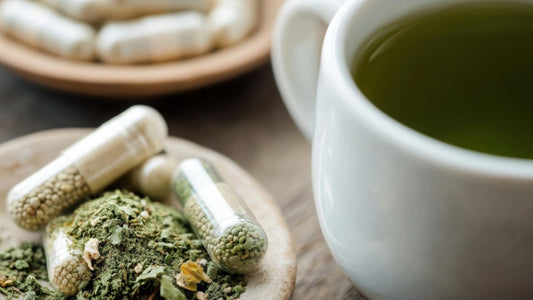The brain fuzzies and lack of focus are never ideal (or welcomed) when you have a day to conquer.
Whether it’s a long day of meetings, a hard day of training, or just managing the ins and outs of daily life, getting through a day without overdosing on coffee can be hard enough—tack on serious brain fog, and it makes it 10x harder. A shot or two of espresso may do the trick, but if you’re looking for long-term mental clarity without the caffeine, herbs might be your light at the end of the tunnel.Herbal preparations have been used for centuries as a powerful natural way to boost cognitive power and clear brain fog, in addition to a host of other awesome benefits.
So, if you’re head to clear your mind and get the show on the road, you’re in the right place.
In this article, we’ll dive into all the plant wisdom on the best herbal remedies for mental clarity—and optimizing brain health overall.
What Is Brain Fog?
Brain fog—it’s that fuzzy-headed, lack of focus, poor attention kind of mental state that sometimes happens when you don’t get enough sleep or haven’t downed your first cup of coffee. Know what we’re talking about?Brain fog is a big thing for a lot of people, and while there’s no concrete definition of what brain fog is, it’s generally a collection of symptoms that all point to a lack of mental clarity.
And because most people experience brain fog differently, it can be difficult to pinpoint. For many, it’s things like mental sluggishness, fuzziness, haziness, or just general feelings of being unwell or not yourself. For some people, it can feel like your head is in the clouds or you’re not with it; rather than a brain, your head is packed with fluff.
Generally speaking, you lack the mental clarity you’re used to having, which leaves you inattentive and forgetful with a lack of focus, concentration, and poor memory.As we said, there are no diagnostic criteria for brain fog because it’s not an official clinical condition, so diagnosing it is hard.
Because of individual differences in how brain fog manifests, it could be six cups of coffee for you to wake up, while for someone else, it could be snacking every few hours to prevent brain fuzziness. And although there may not be a clinical diagnosis, there are several factors that can contribute to a lack of mental clarity.
What Causes Brain Fog?
Without proper diagnostic criteria, pinpointing the exact cause of brain fog can be challenging.
But when you dig into what’s going on behind the scenes, you find there are a few culprits that can leave your head in the clouds more often than you’d like.
Diet and nutrition
What crosses through your lips is the foundation of your health. Food influences every function in your body, and when it comes to cognition and mental clarity, diet can make or break it.
So, if you’re constantly experiencing brain fog, your diet is the first (and easiest) place to start.For optimal function, the body requires a balance of all essential vitamins and minerals. A deficiency, or sometimes even an excess, or any single nutrient can lead to a host of adverse reactions, some of which can manifest in the brain.
For example, B vitamin deficiencies often lead to cognitive issues, including fatigue, emotional disturbances, confusion, poor memory, cognitive decline, behavior changes, and general cognitive impairment 1. But it’s not just what you’re not eating—it could also be what you are eating.
Gluten, specifically, is known to cause brain fog and contribute to systemic inflammation, which can exacerbate cognitive issues 2.
Stress
Most people don’t realize how much damage stress can do, and while eliminating stress would be a dream, it’s not realistic—and some level of stress is beneficial for the body.
But when stress becomes chronic and isn’t managed, it can spell trouble for cognitive function.
High stress levels lead to chronic activation of the sympathetic nervous system and elevated stress hormones, affecting sleep, energy levels, cognitive function, and neurodegenerative disease risk 3.But why does this happen?
Elevated stress hormones—cortisol, epinephrine, and norepinephrine—ultimately divert energy and resources away from non-essential physiological functions to help your body fight.
This is why the sympathetic nervous system is also called the “fight-or-flight” system. When resources aren’t going to your brain, your cognitive state suffers.
Poor sleep
Whether you’re not sleeping enough or not sleeping well enough, lack of sleep is a doozy for brain function—and if you’ve ever woken up after just a few hours of sleep, you know that it’s difficult to think properly.
Insufficient sleep leads to feeling foggy and congested up top and can also interfere with attention, focus, memory, decision-making, alertness, reaction time, and motivation 4.Getting less than the recommended sleep doesn’t do your body any favors and disrupts your circadian rhythm (your internal clock), which throws off certain body functions.
And there are two things, specifically, that play a major role:Blue light: The light wavelength emitted from all devices with a screen severely impacts the body’s hormones, especially at night.
It interferes with melatonin secretion at night and instead causes the release of cortisol; cortisol works against melatonin to increase arousal and alertness.
Research shows continuous exposure to artificial light can disturb sleep patterns and cognitive performance, altering memory, mood, attention, sleep-wake cycle, and alertness 5. It also interferes with active memory and reaction time.
Brain detox: Lack of sleep also interferes with your brain’s ability to detox. During waking hours, gunk accumulates in your brain that must be cleared during sleep.
And because the glymphatic system—the system of blood vessels in the body that removes waste from the brain and central nervous system—is most active at night during sleep, not sleeping enough impairs this detoxification process, which can leave you feeling mentally dull and foggy in the morning 6.On top of these three factors, there are three other minor contributors:
- Hormonal imbalances
- Prescription medications
- Pre-existing medical conditions
So, apart from doing a lifestyle and diet overhaul, how do you manage brain fog and lack of mental clarity?
For anyone looking to optimize brain functions, herbs are a saving grace. Let’s check out our best five herbal recommendations for mental clarity.
The 5 Best Herbs For Mental Clarity
Rhodiola Rosea
Adaptogens are some of the most popular substances for supporting the body through times of stress.
They are herbs that help to counteract the effects of stress on the body and exhibit neuroprotective, anti-fatigue, anti-depressive, anxiolytic, nootropic, and CNS stimulating activity 7.
Although they don’t eliminate the threat, they do increase the state of non-specific resistance during stress and decrease sensitivity to stressors, leading to greater stress protection.Although there are several effective adaptogens for combating stress and promoting mental clarity, we want to give Rhodiola rosea some attention.
Thanks to its apoptogenic nature, this herb can support the body during times of stress, protect cellular and metabolic functions during excessive exposure to stress, and prevent fatigue. Rhodiola has been found to have anti-depressive properties by supporting neurotransmitter balance in the brain 8. One study found that a repeated low dose of R. rosea effectively improved students’ mental and physical well-being during examination periods 9.
Just 100 mg daily for 30 days improved hand-eye coordination, mental fatigue, and general well-being compared to the placebo. Another study found that just four weeks of supplementation improved fatigue symptoms and greater attention 10.
Bacopa Monnieri
Bacopa, also known as Brahmi, is another Ayurvedic herb that’s spectacular for cognitive function.
It has traditionally been used as one of the more popular herbs for supporting mood, memory, and focus, but it also reduces stress and improves energy.It possesses potent antioxidant activity that’s thought to be responsible for its antistress, immunomodulatory, cognition facilitatory, anti-inflammatory, and anti-aging effects. Its memory-enhancing action is thanks to its anti-lipid peroxidation 11.
As a nootropic, Bacopa benefits memory and cognitive processing through its effects on various neurotransmitters, including serotonin, noradrenaline, dopamine, and acetylcholine, while calming the central nervous system and supporting a balanced mood.
Lion’s mane
At first glance, lion’s mane mushrooms look a lot like their name—and a bit weird!
But when you dig into the details on why they’re so powerful, the results are fascinating! They’re a funky-looking, mop-type mushroom known for their potent anti-inflammatory, antioxidant, and immunostimulant properties. Simply put, they’re pretty amazing.
And if you want better memory, slower aging, and supercharging your brain cells, lion’s mane mushrooms might be worth a look. The brain naturally slows down over time, and many symptoms associated with aging—memory loss, fatigue, lack of focus—result from nervous system factors like shrinking neurons and damaged brain cells.
But studies show that lion’s mane mushrooms may be beneficial for brain health by stimulating the synthesis of two essential compounds: nerve growth factor (NGF) and brain-derived neurotrophic factor (BDNF) 12, 13.
These proteins stimulate new brain cell production and strengthen existing ones. NGF is essential for forming myelin, the sheath surrounding nerve cells that supports proper brain cell function. BDNF, on the other hand, enhances brain plasticity to combat stress and aging. Studies also find that lion’s mane mushrooms may exert protective effects on brain cells, improve memory, and promote the generation of new neurons 14,15. And if that’s not enough, they may also support a better mood and focus 16.
Turmeric
Turmeric is a spice that’s been used in Ayurvedic medicine for as long as time.
It contains an active compound called curcumin, responsible for many of its anti-inflammatory and antioxidant properties, which are critical for brain health.Although turmeric and curcumin have been found effective for a long list of conditions, their effects on the brain are largely due to the ability to mitigate inflammation and offer neuroprotective properties 17.
By combating free radicals in the body, curcumin can preserve neuronal integrity, which inhibits the development or progression of cognitive disorders and mental decline. As such, we see slower brain aging and fewer symptoms of brain fog 18, 19. Other studies suggest that turmeric may enhance brain health and ward off Alzheimer's disease by clearing the brain of a protein called beta-amyloid 20.
A buildup of beta-amyloid is a massive factor in the development and progression of cognitive disorders like Alzheimer's. It may also protect the brain by inhibiting the degradation of nerve cells.
Ashwagandha
Last but not least, we have another super powerful adaptogen. Ashwagandha has also been used for centuries in Ayurvedic medicine thanks to its ability to support the body during stress.
The reason why it’s so effective is that it acts on all three stages of the stress response: the alarm, resistance, and exhaustion phases.
After increasing your threshold to deal with stress, ashwagandha supports the breakdown and recycling of stress hormones to eliminate them from the body, downregulating the stress response and maintaining optimal physiological function.But apart from mitigating stress, this powerful adaptogen also benefits brain function.
Some research suggests that it may, like turmeric, inhibit the formation of beta-amyloid plaques that contribute to neurogenerative diseases like Alzheimer’s 21.
Other studies show that ashwagandha may be beneficial for improving immediate and general memory in people with mild cognitive impairment and executive function, attention, and information processing speed 22.
Other Tips For Keeping A Clear Mind
All that said, herbal supplements are an excellent way to fend off brain fog and achieve peak mental clarity, but there are other natural (and easy) ways to keep your brain free from clutter! Here are a few great places to start:
- Get enough sleep (7-9 hours each night)
- Avoid alcohol and drugs
- Clean up your diet
- Take creative breaks during work
- Embrace a mid-day (cold) shower
- Limit multi-tasking
- Be kind to yourself
And if you want an easy way to optimize your brain health and function with a single supplement, Mind Lab Pro is gold.
It’s the world’s most potent nootropic, intelligently stacking 11 research-backed nootropics—in precise doses and advanced forms—that complement each other for optimal focus, clarity, memory, mood, and long-range cognitive health.
References
- Kennedy DO. B Vitamins and the Brain: Mechanisms, Dose and Efficacy—A Review. Nutrients. 2016;8(2):68.
- Lanza G, Bella R, Cantone M, Pennisi G, Ferri R, Pennisi M. Cognitive Impairment and Celiac Disease: Is Transcranial Magnetic Stimulation a Trait d'Union between Gut and Brain?. Int J Mol Sci. 2018;19(8):2243.
- Scott SB, Graham-Engeland JE, Engeland CG, et al. The Effects of Stress on Cognitive Aging, Physiology and Emotion (ESCAPE) Project. BMC Psychiatry. 2015;15:146.
- Alhola P, Polo-Kantola P. Sleep deprivation: Impact on cognitive performance. Neuropsychiatr Dis Treat. 2007;3(5):553-567.
- Bansal N, Prakash NR, Randhawa JS, Kalra P. Effects of blue light on cognitive performance. Int Res J Eng Techmol. 2017;4(6):2434-42.
- Jessen NA, Munk AS, Lundgaard I, Nedergaard M. The Glymphatic System: A Beginner's Guide. Neurochem Res. 2015;40(12):2583-2599.
- Panossian A, Wikman G. Effects of Adaptogens on the Central Nervous System and the Molecular Mechanisms Associated with Their Stress-Protective Activity. Pharmaceuticals (Basel). 2010;3(1):188-224.
- Mao JJ, Li QS, Soeller I, Xie SX, Amsterdam JD. Rhodiola rosea therapy for major depressive disorder: a study protocol for a randomized, double-blind, placebo- controlled trial. J Clin Trials. 2014;4:170.
- Spasov AA, Wikman GK, Mandrikov VB, Mironova IA, Neumoin VV. A double-blind, placebo-controlled pilot study of the stimulating and adaptogenic effect of Rhodiola rosea SHR-5 extract on the fatigue of students caused by stress during an examination period with a repeated low-dose regimen. Phytomedicine. 2000;7(2):85-89.
- Olsson EM, von Schéele B, Panossian AG. A randomised, double-blind, placebo-controlled, parallel-group study of the standardised extract shr-5 of the roots of Rhodiola rosea in the treatment of subjects with stress-related fatigue. Planta Med. 2009;75(2):105-112.
- Kumar N, Abichandani LG, Thawani V, Gharpure KJ, Naidu MU, Venkat Ramana G. Efficacy of Standardized Extract of Bacopa monnieri (Bacognize®) on Cognitive Functions of Medical Students: A Six-Week, Randomized Placebo-Controlled Trial. Evid Based Complement Alternat Med. 2016;2016:4103423.
- Lai PL, Naidu M, Sabaratnam V, et al. Neurotrophic properties of the Lion's mane medicinal mushroom, Hericium erinaceus (Higher Basidiomycetes) from Malaysia. Int J Med Mushrooms. 2013;15(6):539-554.
- Chiu CH, Chyau CC, Chen CC, et al. Erinacine A-Enriched Hericium erinaceus Mycelium Produces Antidepressant-Like Effects through Modulating BDNF/PI3K/Akt/GSK-3β Signaling in Mice. Int J Mol Sci. 2018;19(2):341.
- Brandalise F, Cesaroni V, Gregori A, et al. Dietary Supplementation of Hericium erinaceus Increases Mossy Fiber-CA3 Hippocampal Neurotransmission and Recognition Memory in Wild-Type Mice. Evid Based Complement Alternat Med. 2017;2017:3864340.
- Tsai-Teng T, Chin-Chu C, Li-Ya L, et al. Erinacine A-enriched Hericium erinaceus mycelium ameliorates Alzheimer's disease-related pathologies in APPswe/PS1dE9 transgenic mice. J Biomed Sci. 2016;23(1):49.
- Nagano M, Shimizu K, Kondo R, et al. Reduction of depression and anxiety by 4 weeks Hericium erinaceus intake. Biomed Res. 2010;31(4):231-237.
- Monroy A, Lithgow GJ, Alavez S. Curcumin and neurodegenerative diseases. Biofactors. 2013;39(1):122-132.
- Sarker MR, Franks SF. Efficacy of curcumin for age-associated cognitive decline: a narrative review of preclinical and clinical studies. Geroscience. 2018;40(2):73-95.
- Cole GM, Teter B, Frautschy SA. Neuroprotective effects of curcumin. Adv Exp Med Biol. 2007;595:197-212.
- Reddy PH, Manczak M, Yin X, et al. Protective Effects of Indian Spice Curcumin Against Amyloid-β in Alzheimer's Disease. J Alzheimers Dis. 2018;61(3):843-866.
- Rao RV, Descamps O, John V, Bredesen DE. Ayurvedic medicinal plants for Alzheimer's disease: a review. Alzheimers Res Ther. 2012;4(3):22.
- Choudhary D, Bhattacharyya S, Bose S. Efficacy and Safety of Ashwagandha (Withania somnifera (L.) Dunal) Root Extract in Improving Memory and Cognitive Functions. J Diet Suppl. 2017;14(6):599-612.



